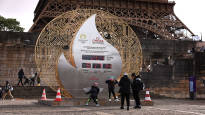Russian and Belarusian track and field athletes will not be seen at next summer’s Paris Olympics, assures the Finnish member of the board of the International Association of Athletics Federations, Antti Pihlakoski.
President of the International Association of Athletics Federations (WA). Sebastian Cohen the most recent statements have sparked a debate about whether Russian and Belarusian track and field athletes could still participate in next summer’s Olympics in Paris.
Coe stated on Monday that “the world is changing” and said that the working group is considering the situation. According to the Reuters news agency, Coe was not completely unequivocal about the issue, although he did say that “nothing has changed”.
Earlier, Coe had already stated that Russian or Belarusian track and field athletes have no business in Paris, even as neutral athletes. Finnish member of the board of the Association (WA). Antti Pihlakoski emphasizes that the guidelines have not changed in any way.
– I do not believe that Russian or Belarusian track and field athletes will be seen at the Paris Olympics, says Pihlakoski.
According to Pihlakoski, the working group is no longer thinking about decisions regarding Paris, but its task is to create perspectives further into the future.
– We want a more detailed set of criteria on how Russians and Belarusians could return to athletics in the long term. And what exactly are the criteria. Now the war has been the reason why Russians and Belarusians have been excluded from athletics, Pihlakoski says.
“Last minute participant additions are not made”
According to Pihlakoski, the issue will be discussed next time only in connection with the Paris Olympics.
– We will probably get the working group’s report for the board meeting in Paris. At this point, I can’t say whether the report is final enough for us to decide on the criteria. But this means that last-minute participant additions will not be made, Pihlakoski explains.
Only a quick peace in the war situation between Russia and Ukraine could bring quick decisions.
– If peace suddenly came, it would probably affect the fact that we would be able to decide on the participation of Russians and Belarusians in Paris. But that is speculation and it is very unlikely that this would happen, Pihlakoski states.
Pihlakoski recommends a strict line for other sports as well
The guidelines of the International Athletics Federation have been stricter than what has been done in many other sports.
– I am very satisfied that we have kept a strict line. If sport can influence a dictator’s thinking or position, then it should be used when the dictator behaves the way the president of our eastern neighbor does, Pihlakoski thinks.
Pihlakoski sends his greetings to the decision makers of other sports as well.
– I hope the same for other sports as well. Ultimately, it is in the hands of the sports federations who will play sports at the Olympics. I hope that all sports associations would make the same decision as us. This would save us a lot of trouble, says Pihlakoski.
Russians and Belarusians competing in Paris can cause many surprising situations.
– Now it can happen that a Russian athlete enters a sport. And let’s say that he has supported Vladimir Putin war when some social update is found. At that point, the focus is on the wrong things than the sport itself, Pihlakoski points out.
